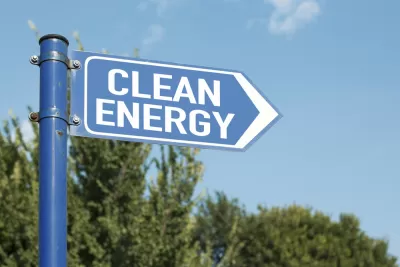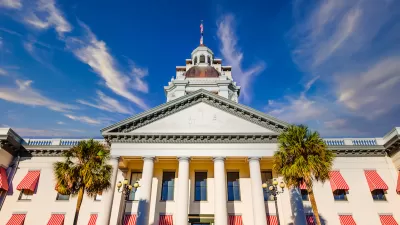As the details of the $3.5 trillion budget package under development in the U.S. House of Representatives begin to emerge, so to do the potential climate change benefits.

A team of researchers at the Rhodium Group has calculated the greenhouse gas emissions at stake in the $3.5 trillion, ten-year budget package currently under consideration in Congress (a package which includes the $550 billion in new spending included in the Infrastructure Investment and Jobs Act.
Recent work on the budget package in the House of Representatives has made it possible for the Rhodium Group to begin estimating the greenhouse gas (GHG) emissions implications of the bill. The team at Rhodium Group identifies a few stand outs among the investments proposed in the current versions of the budget package, including six investments that would cut nearly 1 billion tons of carbon emissions compared to taking no action. "That is up to ten times larger than the impacts we quantified for the Energy Act of 2020, enacted at the end of last year," according to the article. "It’s roughly equivalent to zeroing out annual emissions from all light-duty vehicles on the road or the annual emissions from Texas and Florida combined."
The six big ticket items identified by the Rhodium Group are a clean energy tax credit program, a Clean Electricity Performance Program, funding for rural electric cooperatives, a new electric vehicle tax credit, a fee on methane emissions, and increased funding for carbon removal through soil conservation and reforestation. The biggest source of carbon reductions under the current bill would come from the energy sector.
The potential for significant greenhouse gas emission reductions to come from the energy sector is buoyed by recent research out of Oxford that quantifies the recent reduction of cost for clean and renewable energy production and models out future trends. According to an article by Bill McKibben explaining the research, the coming transition to renewable and clean energy "will likely result in overall net savings of many trillions of dollars--even without accounting for climate damages or co-benefits of climate policy."
As noted in the source article, the budget package has the potential for even more impact from additional projects if or when it proceeds through approval.
FULL STORY: Pathways to Build Back Better: Nearly a Gigaton on the Table in Congress

Planetizen Federal Action Tracker
A weekly monitor of how Trump’s orders and actions are impacting planners and planning in America.

Congressman Proposes Bill to Rename DC Metro “Trump Train”
The Make Autorail Great Again Act would withhold federal funding to the system until the Washington Metropolitan Area Transit Authority (WMATA), rebrands as the Washington Metropolitan Authority for Greater Access (WMAGA).

The Simple Legislative Tool Transforming Vacant Downtowns
In California, Michigan and Georgia, an easy win is bringing dollars — and delight — back to city centers.

The States Losing Rural Delivery Rooms at an Alarming Pace
In some states, as few as 9% of rural hospitals still deliver babies. As a result, rising pre-term births, no adequate pre-term care and "harrowing" close calls are a growing reality.

The Small South Asian Republic Going all in on EVs
Thanks to one simple policy change less than five years ago, 65% of new cars in this Himalayan country are now electric.

DC Backpedals on Bike Lane Protection, Swaps Barriers for Paint
Citing aesthetic concerns, the city is removing the concrete barriers and flexposts that once separated Arizona Avenue cyclists from motor vehicles.
Urban Design for Planners 1: Software Tools
This six-course series explores essential urban design concepts using open source software and equips planners with the tools they need to participate fully in the urban design process.
Planning for Universal Design
Learn the tools for implementing Universal Design in planning regulations.
Smith Gee Studio
City of Charlotte
City of Camden Redevelopment Agency
City of Astoria
Transportation Research & Education Center (TREC) at Portland State University
US High Speed Rail Association
City of Camden Redevelopment Agency
Municipality of Princeton (NJ)





























